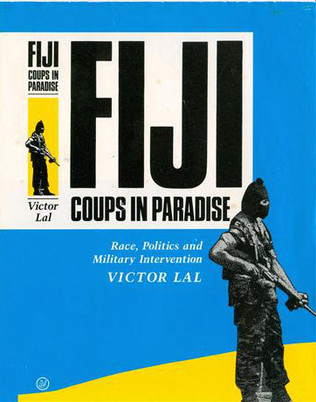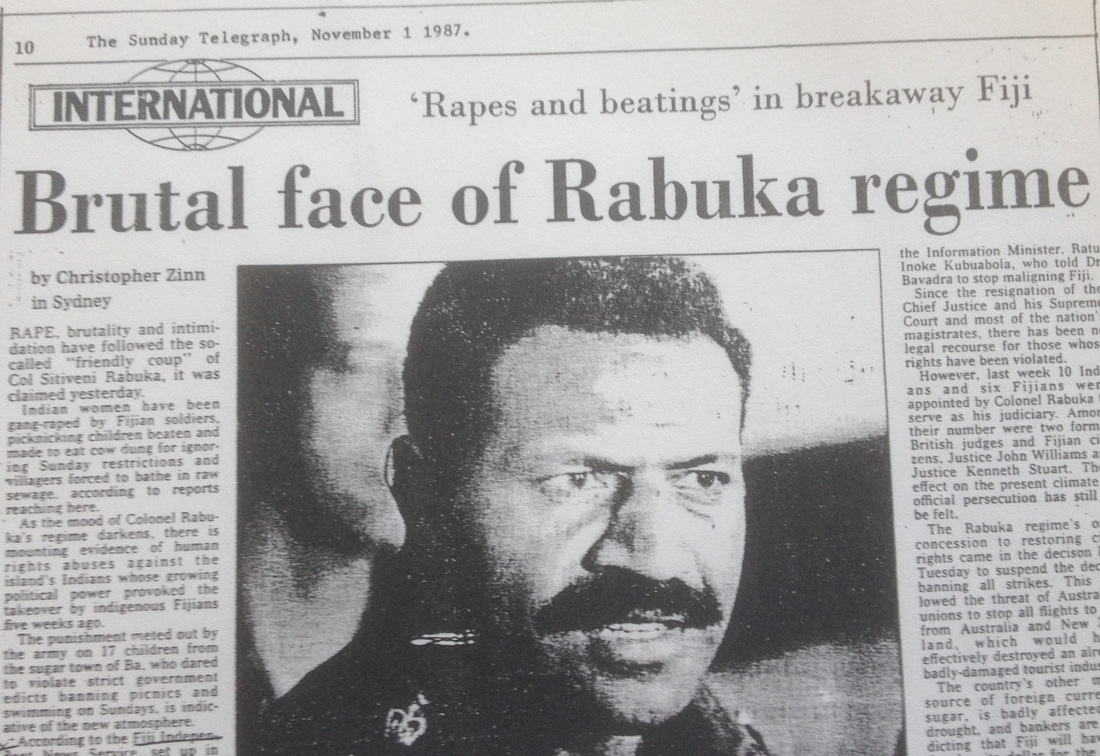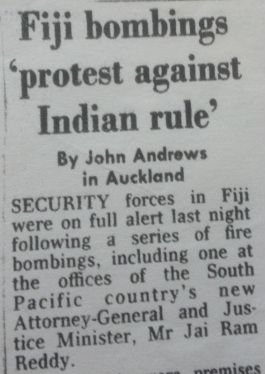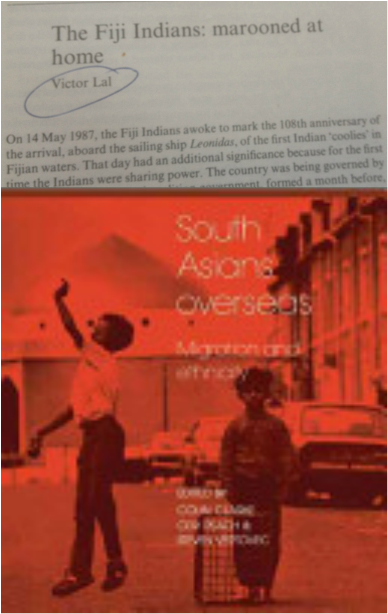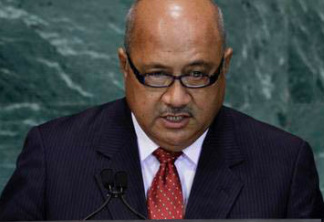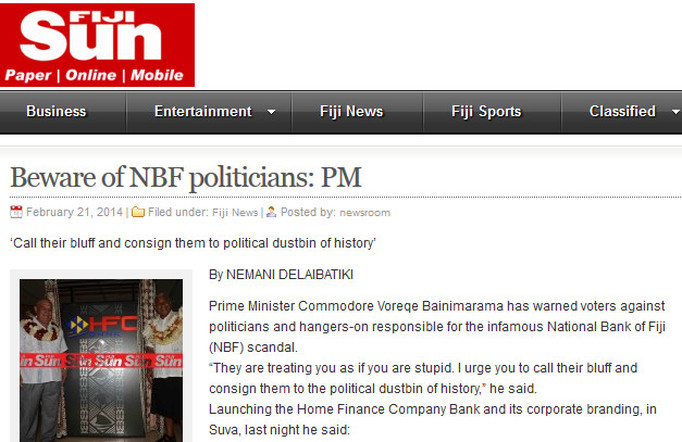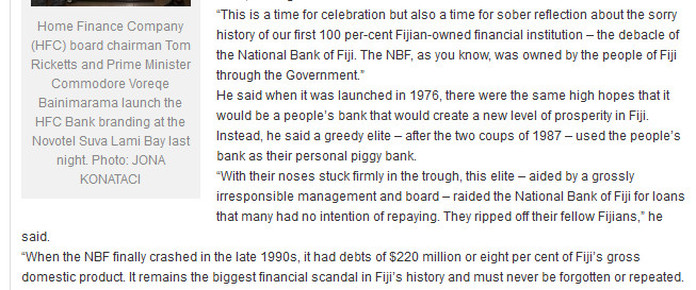![Picture]() VICTOR LAL, the author of the above book, was among the thousands of Indo-Fijians who was driven out of Fiji after the 1987 coups by the racist and violent actions of Fijifirst party candidate and present Foreign Minister Ratu Inoke Kubuabola; in 2000, as Minister for Information in the short-lived post-Speight coup Qarase-led government, Kubuabola took out a full page advertisement in the Daily Post to condemn Lal for standing up for human rights in Fiji. Ironically, the Bainimarama/Khaiyum regime also declared Lal persona non grata from the country of his birth - FIJI - after he exposed, in 2008, Bainimarama's then Finance Minister Mahendra Chaudhry's secret $2million in Sydney bank account. Bainimarama and Khaiyum had refused to sack Chaudhry from their Cabinet. 24 August 2000: Kubuabola attacks Victor Lal after joining post George Speight coup as Minister for Information in the interim Qarase led government:
“Victor Lal’s articles [in Fiji's Daily Post] all have a simple, indeed simplistic stance, restore Chaudhry and impose democracy as defined by Lal and his friends. What he is advocating is an Indian supremacist doctrine, a new version of Hitlerian herrenvolk for Fiji. The racism lies in his desires, not those of us Fijians. His obsession to control Fiji, blinds him to his own ambitions.”
Kubuabola was responding to the London based Movement for Democracy in Fiji which had intensified its fight for deposed Chaudhry’s political rights. The then Commodore Frank Bainimarama had claimed in his February 2001 affidavit before the Fiji Court of Appeal that he had abrogated the 1997 Constitution because he was satisfied that people engaged in the events of May 19 [2000 Speight coup] were of the perception that the document had watered down the interests of indigenous Fijians: “Whether or not those perceptions accorded with reality was not my principal consideration. The perceptions were genuinely held by largely unsophisticated Fijians not equipped to adequately comprehend the niceties and technicalities of the Constitution.” | Excerpt from Victor Lal: Fiji: Coups in Paradise - Race, Politics and Military Intervention:
"Ratu Inoke Kubuabola told Islands Business magazine of May 1988 that for more than six hours on April 19 he and Rabuka, later joined by Jone Veisamasama, 'talked about different options'. It was on 19 April that the groundwork for the coup was laid and according to Kubuabola, 11 May was the day his co-conspirators decided to proceed with its execution. He also claims that when it was learnt that Parliament would not sit on Friday they had agreed to bring forward the coup to Thursday. Another crucial intermediary between the Taukei Movement and the military, the Rev Tomasi Raikivi, provided his house in Suva as a centre for overall planning. Thus it was there that Rabuka met the other conspirators on Easter Monday, nine days after the defeat of the Alliance Party. We will let Rabuka explain the rest, as he did to Eddie Dean and Stan Ritova in his infamous autobiography No Other Way. He went to Rev Raikivi's for, ' … What he understood was an ordinary 'grog' party. It was early evening, and he just walked in, as he normally would, throwing his 'sevusevu' of yagona towards the bowl where the 'grog' was being mixed. 'I saw all these people sitting down, and realised it was some kind of a meeting. Some of the people greeted me, although I could not see everyone clearly because it was fairly dark in the lounge-room. Nobody asked me to leave.' When his eyes adjusted to the darkness, he discovered the gathering was 'quite a formidable group'. He says it included Ratu Finau Mara, Ratu George Kadavulevu, Ratu Inoke Kubuabola, Ratu Keni Viuyasawa, the brother of Brigadier Epeli Nailatikau, Filipe Bole, Ratu Jo Ritova of Labasa, Ratu Jale Ratum, 'Big Dan' Veitata, and the host Raikivi. Another leading light at this meeting was Apisai Tora.''
![Picture]() The South Asian diaspora came into being with the end of slavery in the British Empire. Huge numbers of labourers were recruited in the Indian sub-continent for indentured labour schemes, notably in Southeast Asia, South and East Africa, Mauritius, Fiji and the Caribbean, and also in French colonies. Later there were waves of 'free' immigration to these and other countries, including, in the last generation, Britain itself and North America. This set of essays by scholars from several different disciplines offers detailed accounts of the experience of the migrant communities, and the editors contribute valuable overviews. South Asians Overseas: Migration and Ethnicity, originally published in 1990, is an indispensable resource for scholars interested in the diaspora, or concerned with problems of migration; re-published by Cambridge University Press in paperback, February 2010 ![Picture]() KUBUABOLA: SERIAL COUPSTER, 1987, 2000 and 2006. One of the key violent, nationalistic, opportunistic and racist figure largely responsible for driving thousands of Indo-Fijians out of Fiji after the 1987 Rabuka coup |
